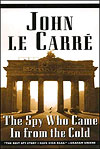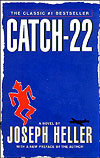
The Grapes of Wrath
By John Steinbeck
Novels that set out to describe grand historical events sometimes struggle with scale: too big, and they lose the particular, the personal; too small, and they lose the immensity, the connectedness of all things. Steinbeck describes the experience of migrating "Okies" during the Depression, and makes you weep on both scales.
By John Steinbeck
Novels that set out to describe grand historical events sometimes struggle with scale: too big, and they lose the particular, the personal; too small, and they lose the immensity, the connectedness of all things. Steinbeck describes the experience of migrating "Okies" during the Depression, and makes you weep on both scales.

Moby-Dick
By Herman Melville
I believe some people have already remarked on this novel. Unflaggingly brilliant and stunningly modern. Besides learning a huge amount about whales and seafaring, you can also impress your friends with the origin of the name Starbuck.
By Herman Melville
I believe some people have already remarked on this novel. Unflaggingly brilliant and stunningly modern. Besides learning a huge amount about whales and seafaring, you can also impress your friends with the origin of the name Starbuck.

The Spy Who Came In from the Cold
By John Le Carré
There are few things quite as beautiful as a well-constructed thriller. This, the coldest of Cold War novels, describes the journey of Alec Leamas, burned-out spy, on his final mission behind the Iron Curtain. It has the symmetrical, mathematical precision of a piece of Bach, and to this day, I get all tingly thinking of the line: "And suddenly, with the terrible clarity of a man too long deceived, Leamas understood the whole ghastly trick."
By John Le Carré
There are few things quite as beautiful as a well-constructed thriller. This, the coldest of Cold War novels, describes the journey of Alec Leamas, burned-out spy, on his final mission behind the Iron Curtain. It has the symmetrical, mathematical precision of a piece of Bach, and to this day, I get all tingly thinking of the line: "And suddenly, with the terrible clarity of a man too long deceived, Leamas understood the whole ghastly trick."

Darwin's Dangerous Idea
By Daniel C. Dennett
Dennett looks at Darwin's idea of evolution in a philosophical and logical framework instead of a biological one. The book points out that if we truly wish to know what we are in the scheme of things, Darwin is the place to start. You think you can grasp the magnitude of Darwin's leap and its implications for all human life and thought. And then Dennett shows you that you're only on the ground floor of a majestic skyscraper. Beautiful.
By Daniel C. Dennett
Dennett looks at Darwin's idea of evolution in a philosophical and logical framework instead of a biological one. The book points out that if we truly wish to know what we are in the scheme of things, Darwin is the place to start. You think you can grasp the magnitude of Darwin's leap and its implications for all human life and thought. And then Dennett shows you that you're only on the ground floor of a majestic skyscraper. Beautiful.

Catch-22
By Joseph Heller
A satire on war, I suppose, but that's a pretty broad and uninteresting category by itself. Catch-22 plays with the first principles of existence: Out of a million possible examples, how about this? One soldier named Dunbar notices that time passes more slowly when you're bored; he therefore sets about cultivating a state of perfect boredom in which time will actually stop, allowing him to live forever. Except that thought itself is interesting, and so hastens his death. And so on. Breathtakingly brilliant stuff.
By Joseph Heller
A satire on war, I suppose, but that's a pretty broad and uninteresting category by itself. Catch-22 plays with the first principles of existence: Out of a million possible examples, how about this? One soldier named Dunbar notices that time passes more slowly when you're bored; he therefore sets about cultivating a state of perfect boredom in which time will actually stop, allowing him to live forever. Except that thought itself is interesting, and so hastens his death. And so on. Breathtakingly brilliant stuff.

The Code of the Woosters
By P.G. Wodehouse
Over the years, wise men and women seem to have more or less agreed that Wodehouse is unmatched as a writer of comic fiction. This book is where my love affair with Wodehouse began.
In this tale, wealthy if intellectually negligible man-about-town Bertie Wooster and his manservant, Jeeves, retrieve a silver creamer in the shape of a cow. Doesn't sound like much, does it? But I warn you, on no account should you drink milk while reading this novel in public. (You probably shouldn't be drinking milk in public anyway.)
By P.G. Wodehouse
Over the years, wise men and women seem to have more or less agreed that Wodehouse is unmatched as a writer of comic fiction. This book is where my love affair with Wodehouse began.
In this tale, wealthy if intellectually negligible man-about-town Bertie Wooster and his manservant, Jeeves, retrieve a silver creamer in the shape of a cow. Doesn't sound like much, does it? But I warn you, on no account should you drink milk while reading this novel in public. (You probably shouldn't be drinking milk in public anyway.)




